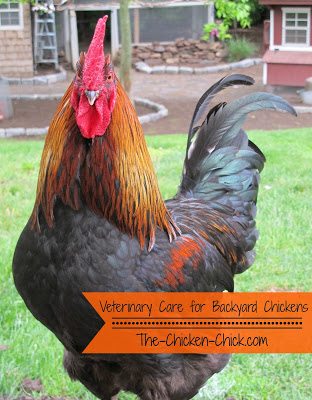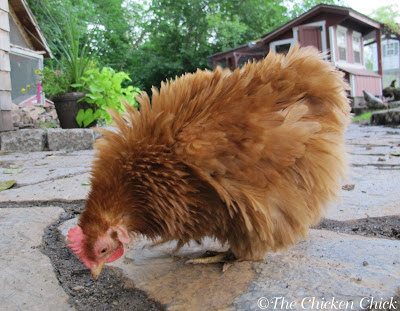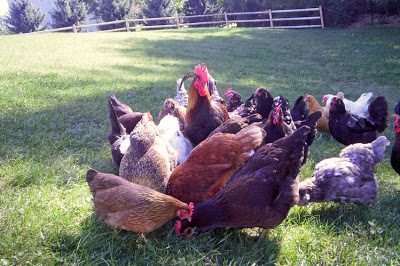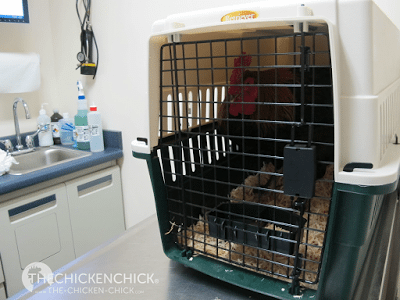After having had three extremely ill chickens in urgent need of medical care recently, it has become painfully apparent to me that finding trained medical professionals who treat backyard chickens is difficult at best. If and when we are able to find any veterinarian willing to treat chickens, we consider ourselves lucky. Once past that hurdle, we just hope that they do the right thing from a treatment perspective, knowing that most vets do not have any significant formal training in poultry care. A 2013 study published by the United States Department of Agriculture’s National Animal Health Monitoring System projecting an increase in urban backyard flocks of over 400% in the next 5 years, it is time to discuss our expectations for medical care of our chickens among ourselves and with our veterinarians.
I have had chicken-care conversations with nearly a dozen vets over the past year, one of whom emailed me last autumn with some questions about starting her own backyard flock. I mentioned the dire need for chicken veterinarians across the United States and she indicated that she “…would like to feel educated on the basics of chicken medicine.” I encouraged her to seek formal education in the field not only for her own future flock, but to help bridge the gap between sick or injured chickens and caregivers. I was heartened to know that she completed some online education this past winter.
Esther had ovarian cancer, a very common condition in older laying hens, which required putting her down. Stella was also euthanized when it was discovered that she had a severe case of egg yolk peritonitis. Both conditions were confirmed by necropsies.
After having participated in a public forum on backyard chicken-keeping recently, this particular veterinarian’s feelings were that: “chicken people complain that vets don’t know anything but they also are willing to pay nothing to have their animals taken care of properly. It’s a bad cycle of bad feelings. I hate for (animals) to suffer with a treatable problem. I could use some guidance regarding charging for treatment and an approach to dealing with the notion that vets don’t know anything about chickens.” She and I have had several discussions about veterinary care for backyard chickens. I admire her candor and willingness to discuss these issues and while I am happy to share my opinions with her, I believe these important topics ought to be discussed within and between the chicken-keeping and veterinary healthcare communities generally. Only by fleshing out these issues collaboratively, nation-wide can we eventually come to a place where we are comfortable discussing our birds’ health with our vets, comfortable with the care our chickens receive and where vets are comfortable including chicken-care as a component of their practice.
Edited to add: This subject hit the front page of The Wall Street Journal after reporter Jon Kamp contacted me to discuss an different topic, piquing his interest in the lack of trained, experienced poultry vets for backyard chickens.
I invite you to share your thoughts on some, any or all of the questions below. Please limit your comments to constructive input regarding your own thoughts, feelings and decisions you would make for your flock. Please refrain from passing judgment on the decisions another chicken-keeper may make for their flock or engaging in debate with another reader. Comments will be moderated to ensure compliance with this request for a judgment-free dialogue.
For example:
DO feel free to share that you view your chickens as livestock and if they are sick, you cull them.
DO NOT share that you believe anyone who takes their chicken to a vet is wasting their money.
Some of the issues you may wish to address are:
- Do you view your backyard chickens as livestock, pets or something else?
- Is it important to you to know that there is a veterinarian available who will treat your chicken(s)?
- Would you bring a chicken to see a vet if they did not have chicken training/experience?
- If a chicken vet practiced medicine in your community, would you bring your chickens to them for well-patient visits?
- Are you willing to pay the same exam and treatment fees for your chickens that you would pay for your cat or dog?
- Do you believe that the negligible cost of purchasing a chicken means that vets should discount their fees? If so, is that fair to the practitioner?
Please feel free to share any other thoughts you may have on the subject of chicken medical care in the comments below.
Kathy Shea Mormino
Affectionately known internationally as The Chicken Chick®, Kathy Shea Mormino shares a fun-loving, informative style to raising backyard chickens. …Read on


shop my SPONSORS
After having had three extremely ill chickens in urgent need of medical care recently, it has become painfully apparent to me that finding trained medical professionals who treat backyard chickens is difficult at best. If and when we are able to find any veterinarian willing to treat chickens, we consider ourselves lucky. Once past that hurdle, we just hope that they do the right thing from a treatment perspective, knowing that most vets do not have any significant formal training in poultry care. A 2013 study published by the United States Department of Agriculture’s National Animal Health Monitoring System projecting an increase in urban backyard flocks of over 400% in the next 5 years, it is time to discuss our expectations for medical care of our chickens among ourselves and with our veterinarians.
I have had chicken-care conversations with nearly a dozen vets over the past year, one of whom emailed me last autumn with some questions about starting her own backyard flock. I mentioned the dire need for chicken veterinarians across the United States and she indicated that she “…would like to feel educated on the basics of chicken medicine.” I encouraged her to seek formal education in the field not only for her own future flock, but to help bridge the gap between sick or injured chickens and caregivers. I was heartened to know that she completed some online education this past winter.
Esther had ovarian cancer, a very common condition in older laying hens, which required putting her down. Stella was also euthanized when it was discovered that she had a severe case of egg yolk peritonitis. Both conditions were confirmed by necropsies.
After having participated in a public forum on backyard chicken-keeping recently, this particular veterinarian’s feelings were that: “chicken people complain that vets don’t know anything but they also are willing to pay nothing to have their animals taken care of properly. It’s a bad cycle of bad feelings. I hate for (animals) to suffer with a treatable problem. I could use some guidance regarding charging for treatment and an approach to dealing with the notion that vets don’t know anything about chickens.” She and I have had several discussions about veterinary care for backyard chickens. I admire her candor and willingness to discuss these issues and while I am happy to share my opinions with her, I believe these important topics ought to be discussed within and between the chicken-keeping and veterinary healthcare communities generally. Only by fleshing out these issues collaboratively, nation-wide can we eventually come to a place where we are comfortable discussing our birds’ health with our vets, comfortable with the care our chickens receive and where vets are comfortable including chicken-care as a component of their practice.
Edited to add: This subject hit the front page of The Wall Street Journal after reporter Jon Kamp contacted me to discuss an different topic, piquing his interest in the lack of trained, experienced poultry vets for backyard chickens.
I invite you to share your thoughts on some, any or all of the questions below. Please limit your comments to constructive input regarding your own thoughts, feelings and decisions you would make for your flock. Please refrain from passing judgment on the decisions another chicken-keeper may make for their flock or engaging in debate with another reader. Comments will be moderated to ensure compliance with this request for a judgment-free dialogue.
For example:
DO feel free to share that you view your chickens as livestock and if they are sick, you cull them.
DO NOT share that you believe anyone who takes their chicken to a vet is wasting their money.
Some of the issues you may wish to address are:
- Do you view your backyard chickens as livestock, pets or something else?
- Is it important to you to know that there is a veterinarian available who will treat your chicken(s)?
- Would you bring a chicken to see a vet if they did not have chicken training/experience?
- If a chicken vet practiced medicine in your community, would you bring your chickens to them for well-patient visits?
- Are you willing to pay the same exam and treatment fees for your chickens that you would pay for your cat or dog?
- Do you believe that the negligible cost of purchasing a chicken means that vets should discount their fees? If so, is that fair to the practitioner?
Please feel free to share any other thoughts you may have on the subject of chicken medical care in the comments below.

































I totally agree that we could all use a lot more educational resources to help us diagnose and treat our flocks. Well-educated vets are one way to go, but for some of us who are trying to keep our flocks healthy while keeping the costs of maintianing our flocks low, taking them to the vet is probably not going to be a cost effective option. I have learned to do a lot of my own vet care, even doing the vaccinations that are not required by law to be given by a vet. The more I know, the less I… Read more »
I strongly agree that this is a dialogue to begin! We raise chickens as livestock (for eggs and meat) yet we also give them respect for what they give us, and we give them TLC when they need it. We've had several in isolation from time to time while we treat them for wounds or try to rejuvenate a listless hen. We have not found a nearby vet that treats chickens or can give advice. We have a vet tech in our family who had very little avian medicine training, but we would pay to get her some continuing education… Read more »
Q: Do you view your backyardchickens as livestock, pets or something else?A: My chickens are pets, same as my dog or cats. Q: Is it important to you toknow that there is a veterinarian available who will treat your chicken(s)?A: Yes, and I do have some names of local vets that might treat chickens, though I haven't visited any of them yet. Q:Would you bring a chicken tosee a vet if they did not have chicken training/experience?A: Yes, if they did have some Avian experience. Q: If a chicken vet practicedmedicine in your community, would you bring your chickens to… Read more »
My thoughts are that vets have to charge what the market will dictate for their services, I live in the middle of nowhere and my vet charge me $300 for a surgery on my dog that the big college hospital in a big city an hour away wanted to charge $1500 for. I would not take my chickens to a vet for well care. However, if one were sick beyond my knowledge I may go just to make sure this was not going to wipe out my flock. This being said, many people in the "city" will spend way more… Read more »
My chickens are livestock (for eggs) and pets, because they are living beings with emotional needs as well as physical needs that I have "caged" for my well-being and thus owe that to them in return. Yes, it is important to have a vet who knows how to treat chickens or at least a local farmer who will give advice he/she learned from her grandparents and parents. :) Perhaps a forum that honors them and invites them into our circles. I have brought my chickens to a vet who doesn't have chicken experience – Dr. Newsome at Blairsville Animal Hospital.… Read more »